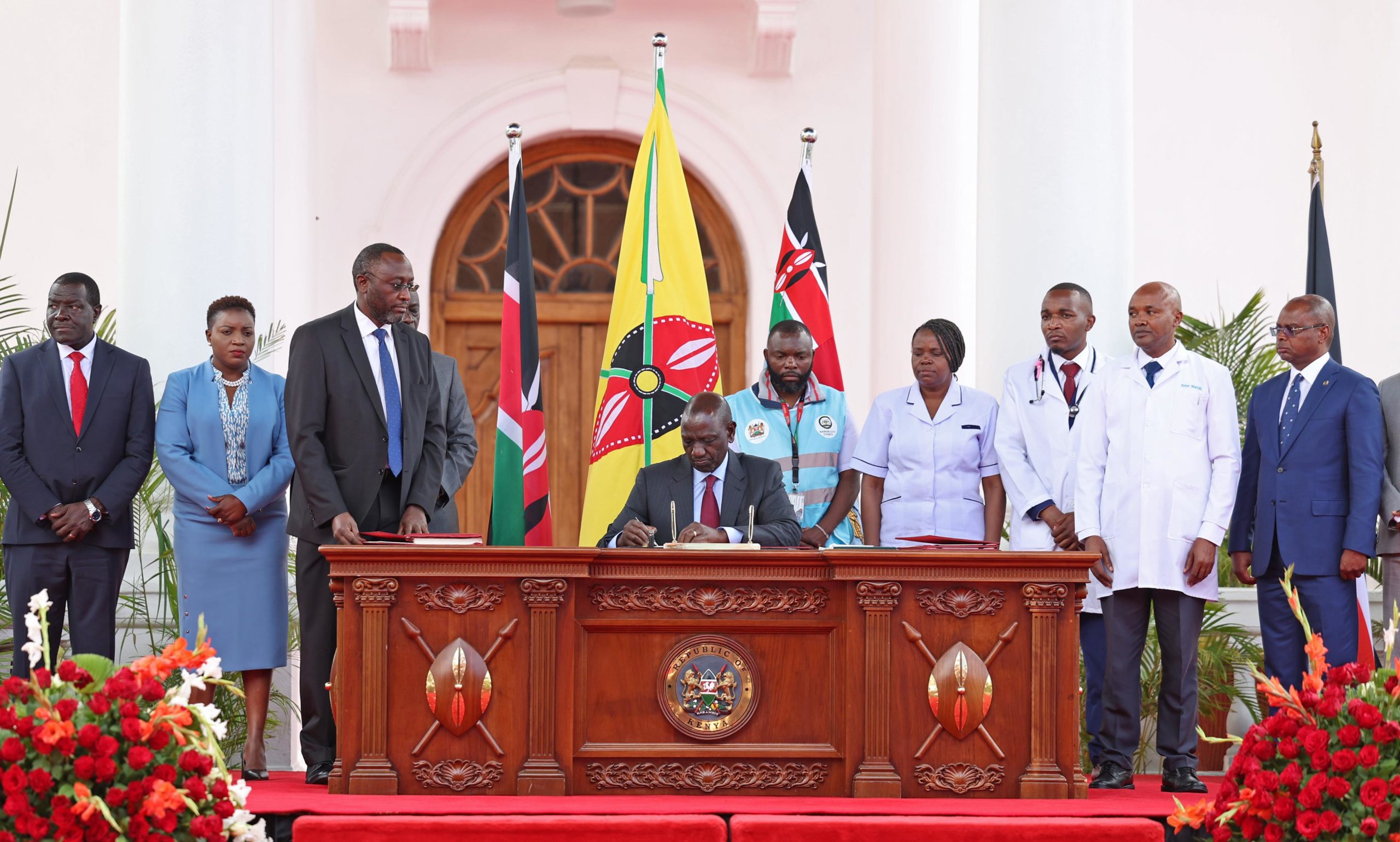President William Ruto on Thursday assented to four health bills that are aimed at progressively achieving Universal Health Coverage (UHC) in Kenya. The new laws promise to significantly improve access to quality and affordable healthcare for all Kenyans. Here is an overview of what each law entails and what citizens can expect:
Social Health Insurance Bill, 2023
The Social Health Insurance Bill, 2023 brings Kenya much closer to achieving Universal Health Coverage. The law establishes elaborate structures for expanding health insurance to all citizens. Here is an in-depth look at some of the key provisions of the new legislation:
Establishing the Social Health Insurance Authority
The law establishes the Social Health Insurance Authority which will manage the various health insurance schemes under the new legal framework.
The Authority will be governed by a Board with representation from the ministries of Health, Finance, the Attorney General’s office, private sector players and health experts.
Registering All Kenyans for Health Insurance
A radical change is that the law mandates every Kenyan to register as a member of the National Social Health Insurance Fund. Even newborns will be registered at birth automatically.
Non-Kenyans who have stayed in the country for over a year will also have to register for social health insurance coverage.
This universal registration is aimed at rapidly expanding the pool of insured citizens to enhance risk pooling. Currently, only a small fraction of Kenyans have some form of health insurance, leaving most exposed to catastrophic out-of-pocket expenditure.
Establishing the Primary Healthcare Fund
Additionally, the law establishes the Primary Healthcare Fund that will be used to purchase essential services like immunization, maternal care, family planning at community health facilities.
Having a dedicated pool of funds for primary care will ensure adequate financing is available at this critical grassroots level.
Mandatory Contributions to the National Social Health Insurance Fund
All registered Kenyans will now be required to make mandatory contributions to the National Social Health Insurance Fund every year.
For salaried workers, contributions will be automatically deducted by employers monthly at a rate to be gazetted. The self-employed and businesses will make annual lumpsum payments based on their income levels, with rates to be set later.
Paying Premiums for the Poor and Vulnerable
Importantly, the new legislation provides for government subsidies to pay premiums on behalf of poor households and vulnerable groups.
Parliament and county assemblies will allocate funds annually to cater for the indigent under the insurance scheme. This will ensure even the poor are covered at no cost to them.
Entitlement to Essential Health Benefits Packages
In return for paying premiums, contributors and their declared beneficiaries will be entitled to essential healthcare benefits packages. The packages cover services ranging from health promotion to palliative care.
The detailed benefits will be published in gazette notices by the Cabinet Secretary for Health based on advice by the Authority.
Enhanced Sharing of Health Financing Risks
The mandatory insurance coverage for both rich and poor Kenyans enhances pooling and sharing of health financing risks across the population. This minimizes exposure to catastrophic out-of-pocket expenditure if one falls ill.
Contributors will also only access services once premiums are up-to-date, with penalties for non-compliance. This guarantees sustainability of the funds.
The new Social Health Insurance legislation fundamentally alters Kenya’s health financing landscape. Universal coverage promises care for all without financial hardship. Proper implementation will progressively actualize this healthcare utopia.
Besides the Social Health Insurance Act, President Ruto enacted three other health laws that aspire to achieve Universal Health Coverage.
The Primary Health Care Bill, 2023
Establishing Primary Health Care Networks
The Primary Health Care law provides for establishment of Primary Health Care Networks at the sub-county level. Each network will have a hub hospital linking with lower health facilities and community units.
The networks will improve coordination and access to care across levels. Citizens will register with their nearest networks.
Role of Multi-Disciplinary Teams
The law formalizes multi-disciplinary teams of diverse health experts who will jointly assess and create customized care plans for patients.
These teams provide holistic patient-centered care compared to individual clinicians. They will be deployed at the primary care network hubs.
Formalizing Community Health Services
It outlines community health services like health education, hygiene promotion and minor treatment that will be delivered at household level by recruited community health workers.
Each community health worker will be assigned households to cover. This shifts some basic services closer to citizens.
County Governments Role in Primary Healthcare
County governments are mandated to facilitate equitable access to quality primary care through supportive policies, adequate funding, training workers and integrating community health services.
The Digital Health Bill, 2023
Establishing the Digital Health Agency
This law establishes the Digital Health Agency which will spearhead nationwide digitization of health services and data management.
The agency will develop core systems like electronic medical records, telemedicine platforms, health information exchanges and patient portals that enhance service delivery.
Health Data Governance Frameworks
The legislation provides comprehensive guidelines for governance of health data including security, privacy, confidentiality, access and sharing protocols.
It also empowers citizens to access their records and cracks down on breaches. This reassures patients their sensitive data is safeguarded.
E-Health Services Coverage
Kenyans will increasingly access diagnosis, prescription refills and expert consultation digitally through platforms like telemedicine and mobile apps.
Service providers will need certification and users’ consent for e-health services. This facilitates care while protecting patient rights.
The Facilities Improvement Financing Bill, 2023
Ring-Fencing Facility User Fee Revenue
This law allows health facilities to retain and utilize the user fees they collect to finance their operations and upgrade infrastructure. Previously, fees went to county coffers.
By ring-fencing the revenues, facilities can address gaps in supplies, equipment and staff without lengthy bureaucracy.
Specified Use of Retained User Fees
The law specifies retained funds must go towards improving patient amenities and services. Facilities cannot divert the money elsewhere.
Oversight structures are also established to ensure accountability in spending of the retained financing. This fosters prudent use of the revenues.
The four health statutes accelerate Kenya’s UHC pursuit through targeted reforms spanning health insurance, service delivery, data management and financing. According to President William Ruto, if fully implemented, the health system will progressively expand access to affordable quality care for all.


















